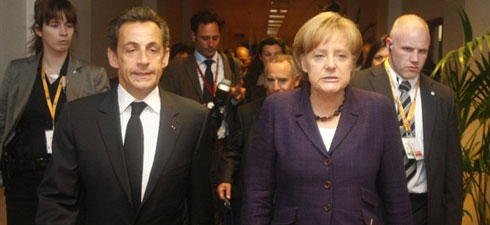"60 years to the day after Robert Schuman’s declaration that started up the building of the European edifice, Europe is going through the most serious crisis in its brief history,” holds forth Le Figaro. "Yesterday, the European Union took the most pivotal decision since the creation of the euro back in 1999: to set up a financial support mechanism for eurozone countries that have trouble paying off their debt,” editorialises El País in a similar vein. "For its anniversary, Europe is trying to save itself from falling apart," opines România libera, adding that "although until recently the problem seemed confined to the eurozone, it became plain last week that it has gone global”.
Adhesive tape to stop the bleeding
The 9 May decision "marks a before and after in European history,” El País goes on to say, and a "decisive gesture laying the bases on which to reduce the flagrant asymmetry between a near-perfect monetary union and the absence of political integration.[…] Member countries will be eligible for this aid if they are subjected to ‘serious threats’ liable to cause ‘major financial upheavals’.” This fund, continues the Spanish daily, “is chiefly designed to protect Ireland, Portugal, Spain and Italy, countries that have seen their debt skyrocket over the past few days”.
"Can the EU stabilisation mechanism counteract doubts about the fate of countries like Greece, Spain and Portugal?" wonders Dziennik Gazeta Prawna: "If the markets react positively, we may see a rebuilding of confidence in the eurozone." Its opposite number Gazeta Wyborcza is more scepticalabout the ability of the rescue package to save Greece, writing it off as nothing more and nothing less than “using adhesive tape to stop the bleeding": hence the likelihood that “we will soon be watching yet another episode of the Greek tragedy”.
A new financial solidarity
"A year ago, who would have bet a euro on the idea of a fund to support eurozone members?" asks La Tribune: "The euro was built on the dogma that club members are not supposed to intervene to bail one another out. But the crisis may well have made the unthinkable possible.” For Libération, "the decision reached – albeit with difficulty – by the 27 is the first step towards a possible reprieve. But how can we imagine even for a second it will suffice to dispel the reigning chaos in the eurozone? The lesson to be learnt from the Greek tragedy unfolding before our very eyes is that Europe doesn’t exist. Or hardly. The events of the past few days have exposed the dysfunctions of a conglomerate of governments which, when faced with tribulations, invariably give in to the temptation to turn in on themselves rather than that of the saving community reflex. The truth is that the EU should make the most of this crisis to really probe its fundamentals.”
"What solidarity is shown arises under threat, and often flies in the face of public opinion,” echoes Le Figaro: "So it remains very brittle. But you never know whether the worst is yet to come, and in the best-case scenario, the main message people will come away with is that Europe is built on crises: despite its internecine strife, it always ends up finding its way back to the essentials. From a political standpoint, Europe is also changing in nature," adds the Parisian daily: “the new financial solidarity born of this crisis is going to impose a new economic governance in return. The influence of the big countries in the zone, France and above all Germany, is going to be reinforced.”
Europe will remember the spring of 2010
The finance ministers of the 27 toiled relentlessly to reach an agreement before the “pack” of markets reopened, reports reports Público. The deliberations in Brussels were stepped up, the paper adds, after Barack Obama, "worried" the crisis might spread to the US, put in a call to Angela Merkel. "The White House was once again beset with the doubts of the Kissinger era,” adds the Portuguese daily: "Now they know perfectly well what number to dial to reach Europe. It’s Berlin’s number, and not Brussels’.” "As Marx once said, 'whoever controls Berlin controls Germany; whoever controls Germany controls Europe’,” concurs the Belgian daily De Standaard: “That’s more true now than ever before: in the long run, the future of the Union and of the euro are entirely in German hands. They are the ones who will decide whether the euro goes down in history as ‘the most lasting monetary pact in European history’. If it doesn’t, the euro could become 'the halt in a post-World War II European integration movement that came to an end after the Great Recession at the beginning of the 21st century."
When all this blows over, "Europe will remember this moment in the spring of 2010 for a long time to come,” concludes Die Zeit: "the Greek lies, the stratagems of other eurozone countries, the fright that rocked the financial markets with their increasingly unscrupulous bets on the Greek state’s going bust. But these critical weeks have shown how far European integration has come in our day.”
Was this article useful? If so we are delighted!
It is freely available because we believe that the right to free and independent information is essential for democracy. But this right is not guaranteed forever, and independence comes at a cost. We need your support in order to continue publishing independent, multilingual news for all Europeans.
Discover our subscription offers and their exclusive benefits and become a member of our community now!












